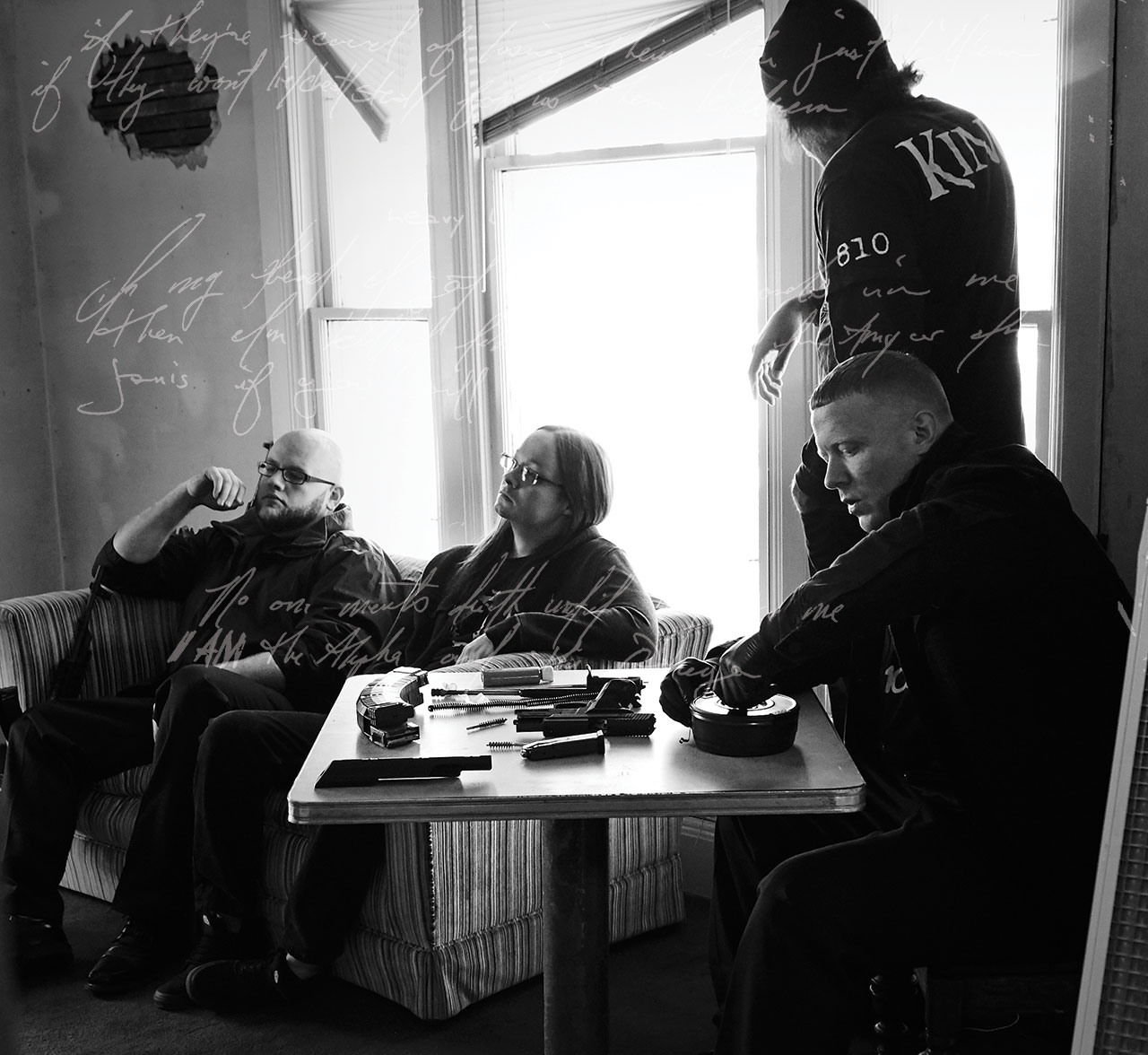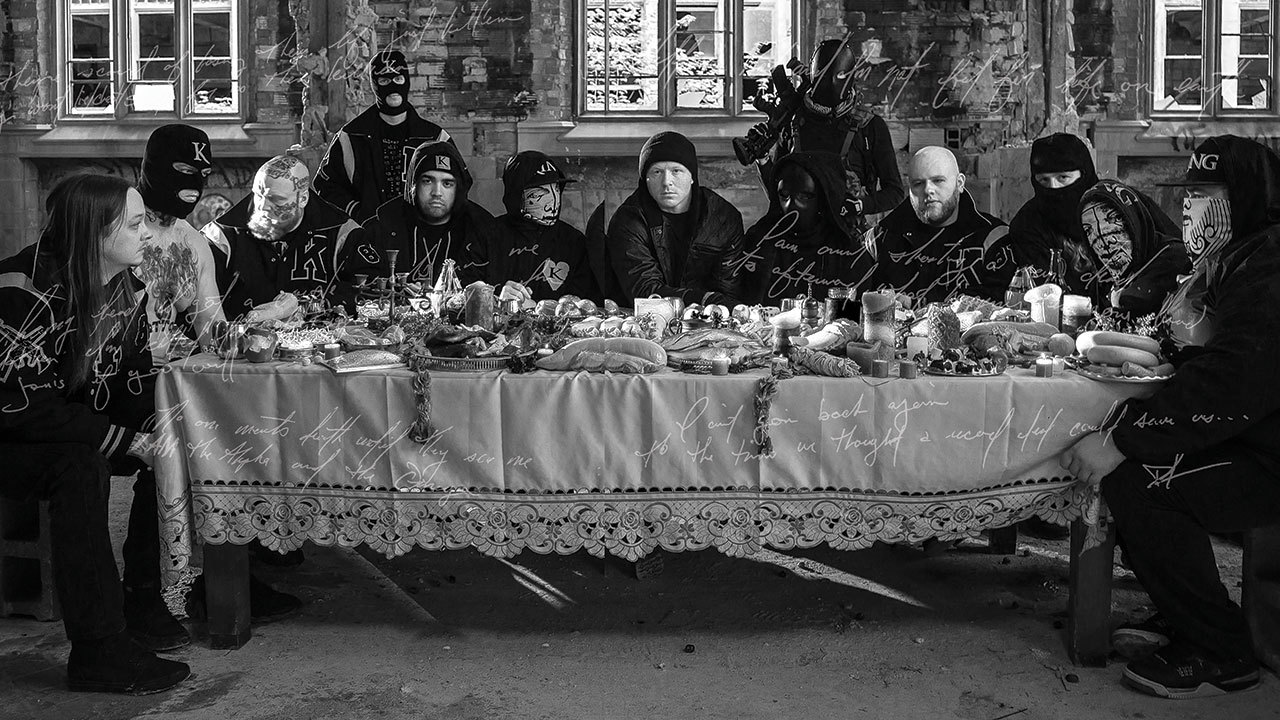“I’ve always been a storyteller. In my group, if someone tells a story, I can tell the same story but better, because I’ve observed so much.”
Like an unexpected bomb blast, King 810 erupted in 2013, with debut album Memoirs Of A Murderer polarising opinion like nothing else released that year. The quartet’s tales of gang violence, criminal endeavours and social disintegration on the streets of Flint, Michigan, were either welcomed as the most viscerally thrilling thing to happen to modern metal in years, or dismissed by cynics as flagrantly over-the-top and manufactured. When the band finally crossed the Atlantic to play some headline shows in the UK in 2014, plenty of fans turned up, but some people poured scorn on the band’s setup, with its police tape, bandana-masked bodyguards and replica guns.
“The guns were a physical or visual representation of the audio of the record,” frontman David Gunn explains today. “They were also necessary, because in reality we don’t belong on a stage with some rigging, amplifiers and lights. This is something like a fish on dry land, so we brought along some water with us.”
Three years on, King 810 have just released their second album, La Petite Mort Or A Conversation With God. A brave, ingenious record that takes the best of everything the band have done so far and moulds it into something far more cohesive, it reveals more about the circumstances that David has to tolerate in Flint, dubbed ‘America’s most dangerous city’, and centre of a recent scandal involving the poisoning of municipal water supplies. But away from his music, David has yet to speak openly about his upbringing and the events that led him to where he is today, so we start our conversation by going back to the beginning.
“I was raised by my mom, in part, and she was a bit of a gypsy woman,” David explains in his laconic Midwest drawl. “Have you seen Thelma And Louise? That’s pretty much how my mom was. When I was a kid, I moved maybe 20 or 30 times a year. I went to a dozen schools a year. When I was in trouble with my mom, I was sent to my dad’s house in the country. It was like a prison. You’d have to ask if you wanted a drink of water and there were no streets. You’re out in the country and you have to walk a mile just to get a loaf of bread. We were poor as shit.”
Among many references to his childhood on the new album, David highlights the deprived environment and poor diet that threatened his early development. He fills in the details now, his voice measured and unemotional.
“When I say ‘poor’, I mean putting ketchup in your water for tomato soup and eating crackers for dinner or not eating at all,” he recalls. “It was sharing bathwater with your siblings. I had five people ahead of me and I’d have to use bathwater that had been used five times. This is when I was eight, nine, 10 years old, so it was a weird life, but my memories are fragmented because I was never anywhere for very long.”
- King 810: Welcome To Hell, USA
- King 810 album review – La Petit Mort Or A Conversation With God
- "This Is 2016's Best Record" - In The Studio With King 810
- Listen to King 810’s 2nd album in full
David started hanging out on the streets of Flint during summers spent with his mother when he was eight. He drove his first car at nine and, with his friends, began “breaking into people’s houses and stealing guns”. As he has revealed previously, he had already seen plenty of dead bodies by this point.
By the age of 12, he was physically imposing enough to feel that no one could really tell him what to do anymore, and made a decision that going it alone on the streets of Flint made more sense than continuing the scattershot existence that he’d previously experienced.
“I ran away from my mom when I was about 14, and I had shit figured out already, you know?” he says. “I knew what I was going to do by that point. I’d been writing songs for about five years. I already felt I was good and that I was on the verge of breaking into this music thing, but I guess my timing was a little off…”
David’s mother moved to Florida when he was 16, allowing him to take responsibility for her house. On the surface, this newfound autonomy sounds like every teenager’s dream, but factor in the guns, drugs and violence that have made Flint so notorious, and David’s adolescence takes on a more nightmarish aspect. It’s hard to imagine how anyone could experience regular emotional development in such circumstances. That troubled life has fired David’s creativity and made King 810 a unique proposition, but the price paid for that artistic identity has been immense. At 30 years old, he is still struggling.
“It’s one of those things… because of the life I’ve had, I’m not an emotional person,” he begins. “But you saying that now…”

For a brief moment, David’s impenetrably tough façade slips and he sounds genuinely choked up, unable to speak. He steadily composes himself and continues.
“I suppose you’re right. I guess this has to be therapeutic in some way, but I always felt like I was just making new things for myself or for my friends. It’s made me a strong person, but it’s not easy to explain how painful it gets sometimes. You definitely do want to trade this life more often than not. Any other hour of the day, I would gladly trade it for something else, something better, but when a song’s been written or played, that’s the only time I wouldn’t.”
The notion of music as a form of catharsis is so overplayed in the modern era that David’s ambivalence to the idea is a breath of fresh air, albeit one tempered by the sustained roar of anguish and fury on La Petite Mort… Either way, it’s an extraordinary album, bursting with clever musical ideas that draw from metal, hip hop, blues, electronica and even jazz, and with numerous moments of stark, goosebump-inducing realism. But will it enable the band to achieve the success their initial impact seemed to promise? Once again, David stands apart from other singers, because becoming a rock star is the least of his worries.
“If I were alone in a room doing this, it’d be exactly the same, and I’d enjoy it just as much, because it was so much easier and simpler when no one gave a fuck about what we were doing,” he notes. “Nothing is contingent on the reception to what we do. There’s no financial incentive and we’re not getting rich on this shit. I’ve no other motives and no one’s going to sway me.”
David pauses, and then, with a faint chuckle, says: “There’s no point in dangling a carrot in front of my face… because I don’t like carrots.”
A widespread suspicion that King 810 are not ‘for real’ continues to be the biggest barrier preventing them from living up to hype that they neither courted nor expected. And as much as David avows that he doesn’t care what anyone else thinks, it’s clear that being dismissed as a fantasist or a shameless exploiter of other people’s misery remains a source of irritation.
“I’m a fucking loser like everyone else,” he states. “I have the shitty Flint water, too. I don’t have some nice house that has something else going on and I’m acting like some kind of out-of-town sympathiser. People round here get that and they understand it. I’m always gonna say what the hell is going on. That’s what the rest of the world doesn’t get. There’s people here that say I’m misrepresenting this life, focusing on the negative, but no one’s calling me a liar, you know?”
Once you accept that the tales David tells on La Petite Mort… are all drawn from real life, give or take a few allegorical conceits, it doesn’t take a genius to work out that King 810 are not just passive observers of Flint’s chaotic, criminal underbelly. David freely admits to having worn police handcuffs on more occasions than he can count, and repeated references to ’handguns and drug runs’ on the new album make it plain that not everything that goes on behind the scenes is above board. You wanted authenticity – well, here it is. But with that in mind, it’s hard to imagine the band’s story ending well, even if La Petite Mort… does connect with the wider world. So are they ultimately doomed? Can being a well-known professional musician possibly fit with nefarious lives spent under the legal radar?
“I think if you sat with that idea for 15 minutes, you would know the answer, because you’d understand how entrenched in this life I am,” David says. “That all takes precedence over some silly record, you know? Does doing King make this life harder? Yes. But do you think I give a fuck about that when I’ve got all this to worry about? I can’t really give up my life or my loyalty to people because people happen to buy a couple of downloads.”
Doomed or not, the record does offer a faint glimmer of hope, if only because it celebrates the fact that David Gunn has made it this far and proved that something great can be wrung from the ugliest of experiences. If nothing else, La Petite Mort Or A Conversation With God should make you pause for a moment and think: compared to all this, what the fuck have I got to worry about?
“It’s empowering, coming out of the other side,” David concludes. “This life really battered away at me, but I’m strong in mind and body because of it. So in that sense, it is a gift. Does it cross the threshold into borderline torture sometimes? Yeah, often. But it does make you stronger if you can get through it. And getting through it just means showing up, one day at a time.”
La Petite Mort Or A Conversation With God is out now via Roadrunner records
King 810: "You don’t flinch at gunfire. You get used to it..."

